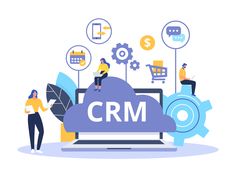In today’s competitive business landscape, companies are constantly looking for ways to improve customer relationships and streamline operations. One of the most powerful tools available to achieve this is Customer Relationship Management (CRM) software. Whether you run a small business or a large enterprise, investing in CRM software can offer a wide range of benefits that enhance productivity, improve customer service, and drive revenue growth. Here’s a detailed look at why investing in CRM software is essential and the top benefits it offers.
1. Centralized Data Management
CRM software provides a centralized database where all customer information is stored and easily accessible to all departments. This ensures that everyone in your organization has access to up-to-date customer data, including sales history, contact details, interactions, and preferences.
Benefits:
- Improved collaboration across teams
- Elimination of data silos
- Streamlined customer information management
2. Enhanced Customer Service
Customer relationships are the backbone of any successful business, and CRM software helps ensure that your team can respond to inquiries and issues quickly and effectively. With access to detailed customer data, customer service representatives can offer more personalized and timely support.
Benefits:
- Faster response times to customer queries
- Personalized customer interactions
- Easy tracking of customer issues and resolutions
3. Automation of Repetitive Tasks
CRM software automates many manual tasks, such as data entry, lead follow-ups, and email communication. By reducing the time spent on repetitive tasks, CRM allows employees to focus on more important activities like engaging with customers and closing deals.
Benefits:
- Increased productivity
- Reduced manual errors
- Streamlined workflows and processes
4. Improved Sales Performance
One of the core benefits of CRM software is its ability to improve sales performance. CRM provides tools for tracking leads, managing pipelines, and automating sales follow-ups. With detailed insights into customer preferences and behavior, sales teams can target prospects more effectively and close deals faster.
Benefits:
- Better lead management and prioritization
- Detailed sales performance analytics
- Increased sales conversion rates
5. In-depth Reporting and Analytics
CRM software offers powerful reporting and analytics features that provide valuable insights into customer behavior, sales performance, and marketing effectiveness. This data allows businesses to make informed decisions based on real-time data, identify trends, and adjust strategies for better outcomes.
Benefits:
- Data-driven decision-making
- Identification of growth opportunities
- Customizable reports and dashboards
6. Improved Customer Retention
CRM software plays a crucial role in helping businesses improve customer retention rates. By providing a complete view of each customer’s interactions, CRM makes it easier to engage with customers at the right time with relevant information, offers, and support. This helps build stronger relationships and fosters long-term loyalty.
Benefits:
- Proactive engagement with customers
- Ability to target customers with personalized offers
- Enhanced customer satisfaction and loyalty
7. Better Marketing Campaigns
CRM software enables businesses to run more targeted and effective marketing campaigns. By segmenting customers based on their preferences, behaviors, and purchasing history, CRM allows marketing teams to craft personalized messages that resonate with specific customer groups.
Benefits:
- Better segmentation for targeted marketing
- Personalized messaging and offers
- Improved ROI on marketing efforts
8. Collaboration Across Departments
CRM software fosters better collaboration between different teams, such as sales, marketing, and customer service. Since everyone has access to the same customer information, teams can work together more efficiently, ensuring that all interactions with customers are consistent and cohesive.
Benefits:
- Enhanced interdepartmental communication
- Unified approach to customer management
- Streamlined business operations
9. Scalability and Flexibility
Most CRM solutions are highly scalable, making them suitable for businesses of all sizes. Whether you’re a small business just starting out or a large enterprise with thousands of customers, CRM systems can grow alongside your business. Additionally, many CRMs offer customizable features and integrations, allowing businesses to tailor the software to their specific needs.
Benefits:
- Adaptability to business growth
- Customizable workflows and features
- Integration with existing tools and software
10. Data Security and Compliance
CRM systems help ensure that customer data is stored securely and comply with data protection regulations, such as GDPR. Modern CRM solutions provide robust security features, including encryption, role-based access, and audit logs, to protect sensitive information.
Benefits:
- Secure storage of customer data
- Compliance with legal regulations
- Reduced risk of data breaches
Conclusion
Investing in CRM software offers a wide range of benefits that can transform how businesses manage customer relationships, optimize operations, and improve sales performance. From automating manual tasks to providing deep insights into customer behavior, CRM systems enable companies to stay competitive in today’s fast-paced business environment. For businesses looking to grow, streamline processes, and provide exceptional customer experiences, CRM software is an invaluable tool.
